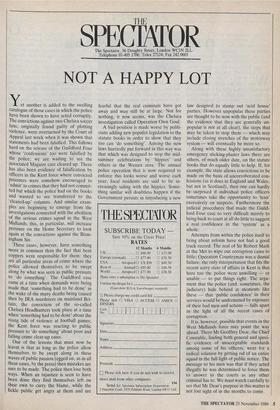SPECTAT THE OR
The Spectator, 56 Doughty Street, London WC1N 2LL Telephone 01-405 1706; Telex 27124; Fax 242 0603
NOT A HAPPY LOT
Yet another is added to the swelling catalogue of those cases in which the police have been shown to have acted corruptly. The convictions against two Chelsea soccer fans, originally found guilty of plotting violence, were overturned by the Court of Appeal last week when it was shown that statements had been falsified. This follows hard on the release of the Guildford Four whose 'confessions' too were falsified by the pOlice; we are. waiting to see the associated Maguire case cleared up. There has also been evidence of falsification by officers in the Kent force where convicted prisoners were somehoW encouraged to `admit' to crimes that they had not commit- ted but which the police had on the books and wanted to see transferred to the `cleared-up' columns. And similar exam- ples are beginning to emerge from the investigations connected with the abolition of the serious crimes squad in the West Midlands; this, in particular, will increase pressure on the Home Secretary to look again at the convictions against the Birm- ingham Six.
These cases, however, have something more in common than the fact that bent coppers were responsible for them: they are all particular areas of crime where the police allowed themselves to be swept along by what was seen as public pressure to 'do something'. The Guildford case came at a time when demands were being made that 'something had to be , done' in the wake of the many deaths being caused then by IRA murderers on mainland Bri- tain; the conviction of the so-called Chelsea Headhunters took place at a time when 'something had to be done' about the rising, tide of violence at football games; the Kent force was reacting to public pressure to `do something' about poor and falling crime clear-up rates. One of the lessons that must now be learnt is that as long as the police allow themselves to be swept along in these waves of public passion (egged on, as in all these cases, by the press) then mistakes are sure to be made. The police then lose both ways. When an injustice is seen to have been done they find themselves left on their own to carry the blame, while the fickle public get angry at them and are
fearful that the real criminals have got away and may still be at large. Not for nothing, it now seems, was the Chelsea investigation called Operation Own Goal.
A bad position is made worse by politi- cians adding new populist legislation to the statute books in order to show that they too can `do something'. Among the new laws hurriedly put forward in this way was that which was designed to stop the mid- summer celebrations by 'hippies' and others in the Wessex area. The annual police operation that is now required to enforce this looks worse and worse each year; local residents are said to be in- creasingly siding with the hippies. Some- thing similar will doubtless happen if the Government persists in introducing a new law designed to stamp out 'acid house' parties. However unpopular these parties are thought to be now with the public (and the evidence that they are generally un- popular is not at all clear), the steps that may be taken to stop them — which may include closing stretches of the motorway system — will eventually be more so.
Along with these highly unsatisfactory emergency sticking-plaster laws there are others, of much older date, on the statute books that do equally little to help. If, for example, the state allows convictions to be made on the basis of uncorroborated con- fessions (as it does in England and Wales, but not in Scotland), then one can hardly be surprised if individual police officers sometimes take the opportunity to 'lean' excessively on suspects. Furthermore the judicial procedures that made the Guild- ford Four case so very difficult merely to bring back to court at all do little to suggest a real confidence in the 'system' as a whole.
Attempts from within the police itself to bring about reform have not had a good track record. The zeal of Sir Robert Mark at the Met to wipe out corruption came to little; Operation Countryman was a dismal failure; the only interpretation that fits the recent sorry state of affairs in Kent is that here too the police were unwilling — or unable — to put things right. The argu- ment that the police (and, sometimes, the judiciary) hide behind at moments like these — that 'public confidence' in their services would be undermined by exposure of their bad men and actions — falls apart in the light of all the recent cases of corruption.
It is, however, possible that events in the West Midlands force may point the way ahead. There Mr Geoffrey Dear, the Chief Constable, finding both general and speci- fic evidence of unacceptable standards among some of his officers, went for a radical solution by getting rid of an entire squad in the full light of .public notice; The message to his men was that if they acted illegally he was determined to force them to answer to the courts as any other criminal has to. We must watch carefully to see that Mr Dear's purpose in this matter is not lost sight of in the months to come.










































































 Previous page
Previous page